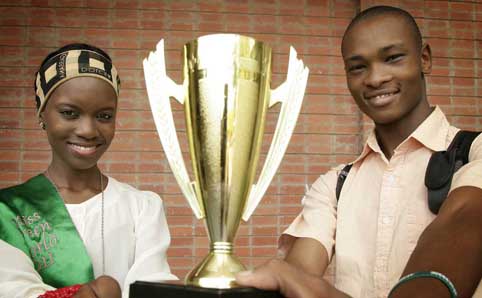 |
|
Students are rewarded for their efforts with waste recycling and energy saving on campus.
Seen here is Molete Lerothodi of Kyalami Residence, winner of the recycling and energy saving competition, together with Boipelo Malope, Ms Green South Africa.
2 March 2012
Photo: Johan Roux
|
Sustainability, to live green, energy saving – call it what you like. This was the focus of the Clean Campus campaign that students on the Bloemfontein Campus of the University of the Free State introduced last year. Apart from it being an opportunity to reward students for their hard work, experts on campus also got the chance to share interesting information with onlookers.
An interesting fact to chew on is that the UFS’s electricity account is to increase by an estimated R38 million rand - from R19 million in 2008 to R57 million in 2012. Another interesting morsel - the university generates 20 tons of waste a day.
Although the university will implement a waste management plan in the near future, experts agree: save water, save electricity and do not squander our precious energy resources.
Madelief Residence was crowned the winner of the Clean Campus campaign. The residence’s reward – a cheque of R1 500. Kestell was second and won a gas braaier.
The competition will be the project of the SRC: Student Development and Environmental Affairs in future.
In the recycling and energy saving competition, which attracted entries from 18 of the 23 residences, Kyalami was placed first, Roosmaryn second and Akasia third.